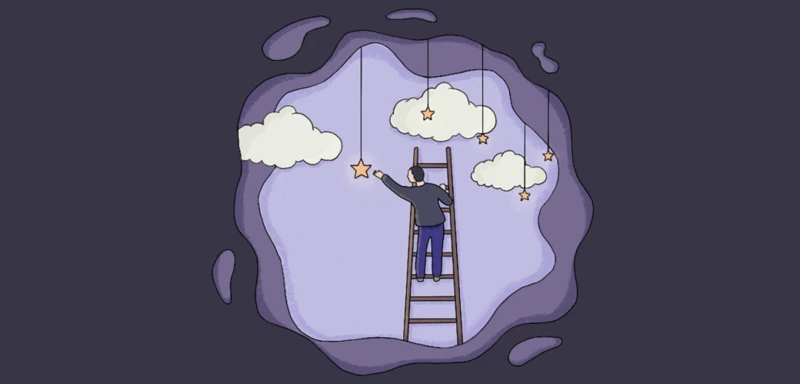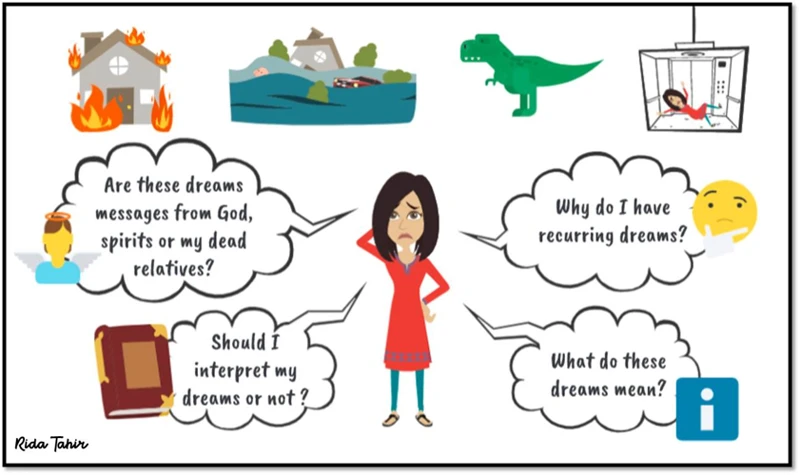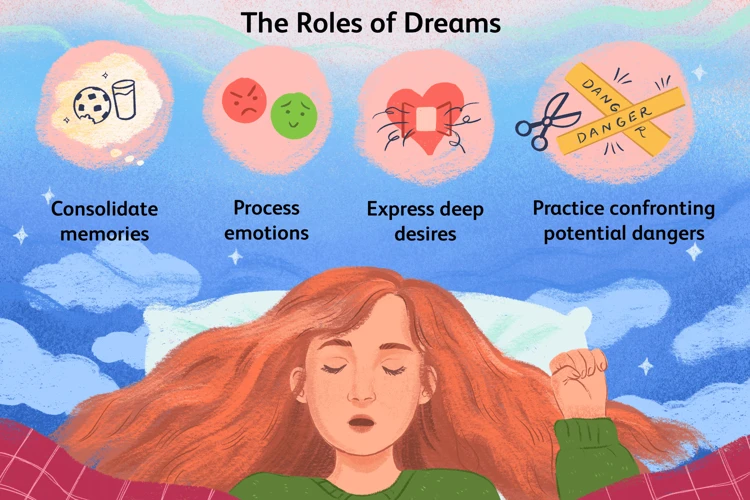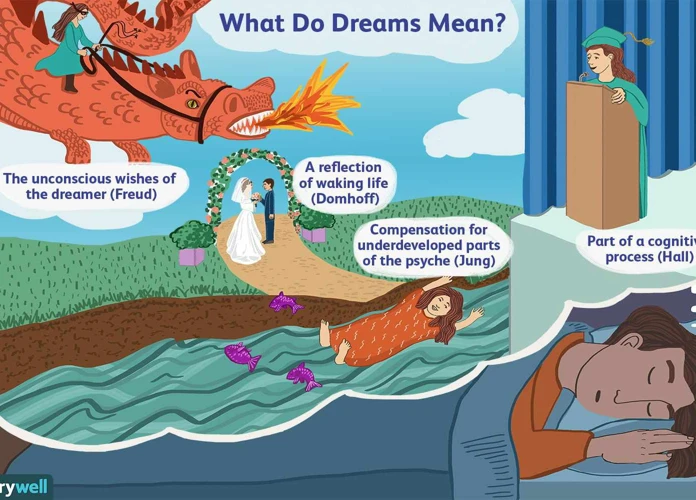Dreams have long captivated the human imagination, offering glimpses into our subconscious minds and providing a window into our deepest emotions. But how exactly can we interpret these enigmatic visions that occur while we sleep? One key aspect to consider is the role of our emotional states in shaping the content and meaning of our dreams. Our emotions weave a complex tapestry within our dreams, influencing the symbols, scenarios, and messages that emerge. In this article, we will explore how to interpret dreams based on our emotional states, deciphering the hidden messages and insights that lie within the landscapes of our sleeping minds. Whether you experience joy, fear, or a mix of emotions, understanding the emotional cues in your dreams can unlock a world of self-discovery and personal insight. So, let’s embark on this dream journey together and unravel the mysteries that lie within our unconscious minds.
Understanding the Role of Emotions in Dream Interpretation

Emotions play a crucial role in dream interpretation, as they provide valuable insights into our subconscious thoughts and feelings. When we dream, our emotions influence the content and atmosphere of the dream, ultimately shaping its meaning. Research shows that different emotions elicit distinct dream scenarios and symbols, highlighting the strong connection between our emotional state and dream experiences. For instance, feelings of joy and happiness in waking life often manifest as pleasant and uplifting dreams, filled with vibrant colors and positive imagery. On the other hand, dreams influenced by fear and anxiety may feature dark and ominous settings, triggering nightmares or scenarios that reflect our deepest fears and worries. Understanding the role of emotions in dream interpretation allows us to delve deeper into the hidden messages and symbolism within our dreams, providing a pathway towards self-awareness and personal growth. By analyzing the emotions present in our dreams, we gain valuable insights into our unconscious desires, fears, and unresolved issues. This knowledge can help us navigate our waking lives with greater clarity and emotional intelligence. To learn more about the link between dreams, emotions, and personal growth, check out this article.
Interpreting Dreams Based on Positive Emotional States

Interpreting dreams based on positive emotional states allows us to explore the uplifting and empowering aspects of our subconscious mind. When we experience joy and happiness in our dreams, it signifies a sense of fulfillment and contentment in our waking lives. Dreams filled with excitement and anticipation may indicate a desire for new experiences or a sense of eagerness towards upcoming events. These dreams often feature vibrant colors, dynamic scenarios, and a heightened sense of energy. Love and affection in dreams can represent deep emotional connections and strong bonds with others, while dreams of contentment and satisfaction reflect a sense of peace and harmony within oneself. Additionally, dreams influenced by confidence and empowerment often feature scenarios in which the dreamer feels capable, in control, and ready to conquer challenges. By understanding the nuances of these positive emotional states in dreams, we can gain a deeper understanding of our own fulfillment, desires, and interpersonal relationships. To explore the meaning of various emotions in dreams, check out this insightful article.
1. Joy and Happiness
Dreams influenced by joy and happiness are often characterized by vibrant and uplifting imagery. These dreams are filled with positive emotions, bright colors, and a sense of euphoria. They may be reflective of our current state of contentment and satisfaction in life, or they may serve as a source of inspiration and motivation. In these dreams, we may find ourselves engaging in activities that bring us joy or achieving goals that make us happy. The symbolism in these dreams often reflects our desires, aspirations, and the things that bring us fulfillment. For example, dreaming about flying may represent a sense of freedom and limitless possibilities, while dreaming about being surrounded by loved ones may symbolize the importance of connection and relationships in our lives. It’s important to pay attention to the details and symbols within these dreams as they hold valuable messages about our deepest desires and sources of happiness. To learn more about the science behind the connection between emotions and dreams, check out this article.
2. Excitement and Anticipation
Excitement and anticipation are powerful emotions that can bring a sense of thrill and eagerness to our lives. When these emotions manifest in our dreams, they often create scenarios that reflect our desires, aspirations, and future possibilities. Dreaming of exciting events like parties, vacations, or important milestones can signify a sense of anticipation and enthusiasm for what lies ahead. These dreams may be filled with vibrant colors, lively atmospheres, and a general feeling of positivity and energy. They can also serve as a source of inspiration and motivation, reminding us of the goals and ambitions that drive us in our waking lives.
In addition to events, dreams influenced by excitement and anticipation may also involve encounters with influential individuals or opportunities for personal growth and success. These dreams can serve as a reflection of our inner drive and ambition, urging us to pursue our passions and seize the opportunities that come our way.
When interpreting dreams of excitement and anticipation, it is important to consider the specific details and symbols present in the dream. Pay attention to the people, places, and objects that stand out, as they may hold valuable clues about what aspects of your life are generating this excitement. Reflecting on these dreams and the emotions they evoke can help you tap into your own inner motivations, guiding you towards a path of fulfillment and purpose.
It’s worth mentioning that dreams of excitement and anticipation can also serve as a form of wish fulfillment, allowing us to experience scenarios or situations that may not be possible in our waking lives. While these dreams can be enjoyable and uplifting, it is important to temper expectations and maintain a realistic perspective. Channeling the energy and enthusiasm generated by these dreams into actionable steps and goal-setting in our waking lives can lead to a more fulfilling and satisfying journey.
Dreams influenced by excitement and anticipation offer a glimpse into our desires, aspirations, and ambitions. These dreams provide us with a surge of positive energy and motivation, highlighting the possibilities that lie ahead. By paying attention to the symbols and details in these dreams, we can gain valuable insights into what drives us and find inspiration to pursue our goals in waking life. So, embrace the joy and exhilaration of these dreams as we explore the incredible world of our emotions and their impact on our dream interpretations.
3. Love and Affection
Dreams infused with feelings of love and affection can be a delightful and heartwarming experience. When we dream about love, it often represents a deep connection, intimacy, and warmth in our relationships or even within ourselves. These dreams may feature romantic encounters, moments of tenderness, or expressions of love from significant others, family members, or friends. Symbolic gestures like hugs, kisses, or holding hands can also appear, reflecting the longing for closeness and emotional fulfillment. It’s essential to pay attention to the emotions felt during these dreams, as they can provide valuable insights into our emotional needs and desires in our waking lives. Ask yourself: Is there something missing in my personal relationships? Do I yearn for deeper connections and affection? Are there any unresolved issues that need attention? Understanding and embracing the emotions associated with dreams of love and affection can help us nurture our relationships, prioritize self-love, and enhance our overall emotional well-being.
4. Contentment and Satisfaction
Dreams influenced by feelings of contentment and satisfaction often reflect a sense of fulfillment and peace in our waking lives. These dreams are characterized by positive and uplifting imagery, where a person may find themselves in tranquil and serene environments. They may be surrounded by beautiful landscapes, peaceful nature scenes, or engaging in activities that bring them joy and contentment. The emotions of contentment and satisfaction in these dreams are typically accompanied by a sense of harmony and balance. For example, one might dream of spending quality time with loved ones, achieving personal goals, or experiencing a deep sense of fulfillment in their work or hobbies. Such dreams can serve as a reflection of the individual’s overall happiness and contentment in their waking life. Additionally, these dreams can reinforce positive emotions and provide a sense of reassurance and motivation to continue pursuing a fulfilling and satisfying life. It is important to recognize and appreciate these dreams as indications of our well-being and the alignment of our desires and aspirations.
5. Confidence and Empowerment
When confidence and empowerment are present in our emotional state, our dreams can reflect a sense of triumph, achievement, and inner strength. These dreams often serve as affirmations of our capabilities and potential. They may feature scenarios where we overcome challenges, conquer obstacles, or receive recognition for our accomplishments. In these dreams, we might find ourselves speaking confidently in public, leading a team to success, or achieving personal goals that align with our purpose and passions. Symbolically, these dreams may include powerful imagery such as soaring through the sky, standing atop a mountain, or wearing a crown, representing our elevated sense of self-worth and belief in our abilities.
In addition to direct representations, dreams influenced by confidence and empowerment can also reveal subtle messages. For example, seeing ourselves in a position of authority or receiving praise and admiration from others in our dream may signal our need for validation and recognition in waking life. It can be a reminder to embrace our strengths and take charge of our own lives.
Dreams of confidence and empowerment can inspire and motivate us to pursue our goals and aspirations more boldly. They can ignite a fire within us, reminding us of our inner potential and urging us to step out of our comfort zones.
It is important to pay attention to the emotions and symbols within these dreams as they hold valuable insights into our self-perception and level of confidence. By examining the details and themes, we can further explore our desires for personal growth and develop a deeper understanding of our own strengths and abilities.
Interpreting dreams influenced by confidence and empowerment encourages us to embrace and celebrate our individuality and unleash our true potential in waking life. It is a reminder that we have the power to create our own success and make a positive impact on the world around us.
Interpreting Dreams Based on Negative Emotional States

Interpreting dreams based on negative emotional states is a fascinating endeavor that can provide valuable insights into our subconscious minds. When we experience emotions such as fear and anxiety in our dreams, it is essential to explore the underlying meanings and messages they convey. One interpretation is that dreams rooted in fear and anxiety may reflect situations or events in our waking lives that we find overwhelming or threatening. These dreams often feature symbols and scenarios that evoke a sense of danger or unease, urging us to address our underlying fears and confront them head-on. Similarly, dreams influenced by anger and frustration may signify unresolved conflicts or pent-up emotions that need attention. These dreams may present themselves as scenes of conflict, confrontation, or intense emotions, urging us to seek resolution in our waking lives. Sadness and grief in dreams may serve as an opportunity for emotional release or as a reflection of our mourning process. Exploring the symbolism and messages within these dreams can help us gain a deeper understanding of our emotional state and provide guidance for healing and personal growth.
1. Fear and Anxiety
Fear and anxiety are powerful emotions that can greatly influence our dreams. When we experience fear and anxiety in our waking life, these emotions often seep into our dreams, creating unsettling and sometimes terrifying scenarios. Dreams influenced by fear and anxiety may feature situations where we feel threatened or pursued by an unknown force. These dreams can be characterized by dark and foreboding environments, symbolizing the unease and apprehension we feel deep within. Common dream symbols associated with fear and anxiety include being chased, falling, or being trapped. These symbols reflect our instinctual desire to escape or avoid perceived danger. It’s important to note that dreams of fear and anxiety are not always negative. They can serve as important messages from our subconscious, urging us to confront and overcome our fears. By facing the fears presented in our dreams, we can gain a sense of empowerment and learn to navigate challenging situations with increased confidence. So, when fear and anxiety manifest in your dreams, embrace them as opportunities for growth and self-discovery.
2. Anger and Frustration
Dreams that are influenced by anger and frustration can often be intense and hostile in nature. When we experience these emotions during our waking life, they may manifest in our dreams as conflict, aggression, or a sense of powerlessness. For example, dreaming about arguments, fights, or confrontations can be a manifestation of repressed anger or unresolved frustrations. The imagery in these dreams may include fiery colors, intense visuals, or chaotic scenarios that reflect the emotional turmoil we are experiencing. It is important to pay attention to the symbols and actions within the dream, as they can shed light on the underlying causes of our anger and frustration. Analyzing these dreams can provide valuable insights into the sources of our negative emotions and help us identify ways to address and release them. It may be helpful to explore techniques such as journaling or therapy to better understand and manage these emotions. By acknowledging and processing our anger and frustration, we can work towards finding healthier outlets and achieving emotional balance in our waking lives.
3. Sadness and Grief
Sadness and grief are powerful emotions that can deeply influence our dreams. When we experience sadness or grief in our waking lives, these emotions often find their way into our dreams, creating a landscape of melancholy and reflection. Dreams influenced by sadness may be characterized by somber tones, muted colors, and a sense of heaviness. Common dream scenarios related to sadness and grief include scenes of loss, separation, or longing for something or someone that is no longer present. These dreams may provide an opportunity for us to process and make sense of our emotions, allowing us to explore our feelings of sadness in a safe and symbolic space. It is essential to pay attention to the specific symbols and narratives within these dreams, as they can offer profound insights into our emotional state and provide a pathway for healing and acceptance. To better understand the meaning behind dreams of sadness and grief, it is important to consider the context of our waking life experiences and any unresolved emotions that may be lingering beneath the surface. Embracing these dream experiences with compassion and self-reflection can aid us in navigating our emotional journey and finding solace in the midst of sorrow.
4. Guilt and Regret
Guilt and regret are powerful emotions that can deeply impact our dreams. When we carry feelings of guilt and regret from our waking lives, they can manifest in our dreams as recurring themes or symbols that reflect our unresolved emotions. Dreams influenced by guilt and regret may involve scenarios where we are confronted with past mistakes or situations where we feel responsible for causing harm or disappointment to others.
In these dreams, we may find ourselves seeking forgiveness or attempting to make amends for our actions. The guilt and regret experienced in dreams can be overwhelming, and the scenarios presented may serve as a reminder of the consequences of our choices or actions. These dreams can also provide an opportunity for self-reflection and personal growth, as they prompt us to confront our feelings of guilt and regret and consider the steps we can take to address them in our waking lives.
In interpreting dreams influenced by guilt and regret, it is important to pay attention to the specific details and symbols present. These may include encountering people from our past whom we have wronged, being unable to rectify past mistakes, or experiencing a persistent feeling of heaviness or burden. The emotions and symbols presented in these dreams serve as a catalyst for self-forgiveness and the process of letting go of the past.
By acknowledging and addressing our guilt and regret in our waking lives, we can work through these emotions and strive for personal healing and growth. It is essential to understand that dreaming about guilt and regret does not necessarily mean that we are inherently bad individuals, but rather indicates an opportunity for introspection and resolution. By accepting responsibility for our actions and making amends where possible, we can move forward with a lighter heart and a renewed commitment to personal integrity and growth.
5. Loneliness and Isolation
5. Loneliness and Isolation
Dreams influenced by loneliness and isolation often reflect our yearning for connection and feelings of being disconnected from others. These dreams may evoke a sense of emptiness, longing, or a desire for companionship. In such dreams, we may find ourselves in desolate landscapes, abandoned buildings, or isolated spaces. These settings symbolize our subconscious feelings of detachment and a lack of social interaction.
Symbols of loneliness and isolation can also manifest in the form of empty rooms, deserted streets, or being the only person in a crowded setting. These dream scenarios highlight our deep-seated longing for meaningful connections and the fear of being left behind or forgotten. It is important to pay attention to the emotions experienced within these dreams, as they can provide clues to unresolved emotional issues in our waking lives.
Loneliness and isolation in dreams can serve as a wake-up call to address feelings of disconnection or to seek out opportunities for building meaningful relationships. It may indicate a need to reach out to loved ones or engage in social activities that foster a sense of belonging. Exploring these dreams with curiosity and self-reflection can help us understand the root causes of our feelings of isolation and take proactive steps to nurture our social connections.
If you want to learn more about unveiling the meaning behind different emotions in dreams, check out this insightful article, which explores the fascinating connection between emotions and dream symbolism.
Exploring Dreams with Mixed Emotional States

Dreams with mixed emotional states can be particularly fascinating and complex to explore. These dreams often reflect the intricate and contradictory emotions we experience in our waking lives. When our dreams involve a mix of positive and negative emotions, it can symbolize the tensions and conflicts we face within ourselves. These dreams may feature diverse scenarios, where joy and sadness, love and anger, or excitement and fear coexist. For example, you might dream of a joyful celebration where you also feel a sense of anxiety or uncertainty. These dreams can be seen as a reflection of the complexities of our emotions and the challenges we encounter in navigating our emotional landscapes. The key to interpreting dreams with mixed emotional states is to pay attention to the interactions between the contrasting emotions. Are they in harmony or in conflict? Understanding these dynamics can provide valuable insights into the ways our emotions are intertwined and how we can better manage and reconcile conflicting feelings. Exploring dreams with mixed emotional states offers a unique opportunity to delve into the depths of our subconscious and uncover the nuances of our emotional experiences.
Using Emotional Clues for Symbolism and Déjà Vu

When interpreting dreams, paying attention to the emotional clues can provide invaluable insights into the symbolism and occurrences within the dream. Emotions often serve as powerful indicators of the underlying meaning and significance of certain elements or events in the dream. For example, if you experience a sense of fear or unease during a dream, it could indicate that there is something in your waking life that is causing you anxiety or discomfort. By analyzing this emotional clue, you can uncover hidden fears or unresolved issues that need to be addressed.
Additionally, emotional clues can also help unravel the phenomenon of déjà vu during dreams. Déjà vu is the feeling of having already experienced a specific moment or event. It can be a perplexing experience, but by examining the emotions associated with the déjà vu in the dream, we can gain a better understanding of its significance. For instance, if you feel a sense of familiarity and nostalgia during a dream, it may suggest that the dream is connected to past experiences or memories that are resurfacing.
By using emotional clues to decipher symbolism and unravel the mystery of déjà vu, we can gain deeper insights into our dreams and their potential meanings. The emotions we experience during dreams act as guideposts, leading us to hidden messages and truths that may not be immediately apparent. So, the next time you have a dream, pay close attention to the emotions evoked and let them guide you towards a richer understanding of your subconscious mind.
Common Dream Symbols and Emotions
Common dream symbols and emotions are intertwined in our dreams, creating a rich tapestry of meaning and interpretation. Dreams have a unique language of their own, using symbols to convey messages from our subconscious minds. These symbols can evoke powerful emotions, further enhancing the significance of the dream experience. Let’s explore some of the most common dream symbols and the emotions they often evoke.
1. Falling: This symbol can evoke fear and anxiety, reflecting a sense of losing control or experiencing a major setback in life. It may also indicate a need for stability or a fear of failure.
2. Flying: Dreaming of flying often elicits emotions of freedom, empowerment, and liberation. It symbolizes a sense of overcoming obstacles and gaining a new perspective on life.
3. Being chased: This dream symbol often triggers fear and anxiety, representing a feeling of being pursued or threatened in waking life. It may indicate unresolved conflicts or a need to confront our fears.
4. Water: Water in dreams can evoke a wide range of emotions depending on its state. Calm and clear water may symbolize emotional tranquility, while turbulent or murky water can represent emotional turmoil or uncertainty.
5. Teeth falling out: This dream symbol is commonly associated with feelings of insecurity or vulnerability. It may reflect a loss of power or control in certain areas of life, such as relationships or career.
6. Being naked in public: This dream symbol often evokes embarrassment, shame, or vulnerability. It may signify a fear of judgment or a desire to reveal our true selves to others.
7. Death: Dreams involving death can stir up a mix of emotions, including fear, sadness, or even curiosity. Symbolically, death often represents the end of one phase or aspect of life and the potential for rebirth or transformation.
It is important to remember that dream symbols and their associated emotions can vary based on individual experiences and cultural influences. While these are common interpretations, personal context and feelings should be considered for a more accurate understanding of dream symbolism. By paying attention to these common dream symbols and the emotions they evoke, we can unlock the deeper meaning behind our dreams and gain valuable insights into our subconscious thoughts and desires.
Conclusion
In conclusion, understanding the role of emotions in dream interpretation is key to unlocking the deeper meanings and messages hidden within our dreams. Emotions serve as a powerful guide, providing clues about our subconscious thoughts, desires, and fears. By recognizing and analyzing the emotional states present in our dreams, we gain valuable insights into our own psyche and can navigate our waking lives with greater self-awareness. Dreams influenced by positive emotions such as joy, excitement, love, and contentment often reflect our inner happiness and satisfaction. Conversely, dreams influenced by negative emotions like fear, anger, sadness, guilt, and loneliness reveal unresolved issues and areas for personal growth. By exploring these dreams with mixed emotional states, we can unravel complex layers of symbolism that contribute to a richer interpretation. Additionally, paying attention to emotional cues in dreams can also aid in recognizing patterns and experiencing déjà vu. It is important to remember that dream interpretation is subjective, and the meanings may vary for different individuals. It is a personal and introspective journey that requires patience, reflection, and an open mind. So, the next time you ponder the meaning behind a dream, allow your emotions to guide you, embracing the insights and revelations that lie within the borders of your slumbering mind.
Frequently Asked Questions
1. Can dreams accurately reflect our emotional state?
Yes, dreams can provide a glimpse into our emotional state by reflecting our subconscious thoughts, fears, desires, and unresolved issues. The emotions experienced during dreams often parallel the emotions we are experiencing in waking life, allowing us to gain a deeper understanding of our inner selves.
2. Do all dreams have emotional content?
While not all dreams may evoke strong emotions, emotions are an integral part of dream experiences. Even seemingly neutral dreams may carry underlying emotional themes or subtle emotional undertones that can be deciphered with careful analysis.
3. Are positive dreams always a reflection of happiness?
Positive dreams are not always an indicator of happiness. They can also symbolize fulfillment, contentment, success, or the attainment of personal goals. Interpreting positive dreams involves considering the specific emotions and symbols present within the dream context.
4. Why do we sometimes have nightmares that evoke intense fear?
Nightmares often stem from repressed fears, anxieties, or trauma. They can serve as a way for our subconscious mind to process and confront these emotions. By exploring the underlying causes and themes of nightmares, we can better understand and overcome our fears.
5. Is there a link between dreams and our waking emotions?
Yes, there is a strong connection between dreams and our waking emotions. Our dreams can be influenced by the emotional events and experiences of our daily lives. Similarly, the emotions we feel upon waking can be influenced by the content and intensity of our dreams.
6. Can interpreting dreams based on emotions help with personal growth?
Absolutely. Interpreting dreams based on emotions can provide valuable insights into our subconscious mind and aid in personal growth. By recognizing and understanding the emotions present in our dreams, we can address unresolved issues, gain self-awareness, and make positive changes in our lives.
7. Are there specific techniques for deciphering emotional symbolism in dreams?
Yes, there are various techniques for deciphering emotional symbolism in dreams. These include keeping a dream journal, analyzing recurring emotions and themes, exploring personal associations with dream symbols, and seeking guidance from dream experts or therapists.
8. Can the same dream symbol evoke different emotions for different people?
Absolutely. Dream symbols can have unique meanings and emotional associations for different individuals based on personal experiences, cultural backgrounds, and beliefs. The interpretation of a dream symbol should consider the specific emotional responses and personal contexts of the dreamer.
9. How can I remember the emotional aspects of my dreams more vividly?
To enhance dream recall and remember the emotional aspects of your dreams, practice good sleep hygiene, keep a dream journal, reflect on your emotions upon waking, and engage in relaxation techniques before sleep. These practices can help improve dream recall and enhance emotional memory.
10. Can dreams help us process and heal from emotional trauma?
Yes, dreams can play a role in processing and healing from emotional trauma. Dreams provide a safe space for the subconscious mind to process and integrate difficult emotions and experiences. Analyzing and understanding these dream experiences can support the healing and recovery process.








